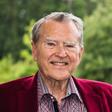RT Kendall makes the case for embracing both holy scripture and Holy Spirit
This month marks exactly 70 years since I entered the preaching ministry. I will be forever grateful to God that very early on, while working as a student pastor at Trevecca Nazarene University in Nashville, Tennessee, I was blessed with an unexpected experience of the Holy Spirit.
It began with an open vision of Jesus while I was driving my car. After this, the Bible became a new book. I read verses I had never noticed before. I was gripped with an entirely new way of thinking. For the first time, I knew I was eternally saved, that I had been chosen. This was my first taste of predestination and a robust view of the sovereignty of God, doctrines which are a feature of what’s known as Reformed theology.
During the following ten months, I continued to have a series of visions. They indicated that I would have a ministry outside of my denomination that would go around the world. I was only 21 when I received this prophetic vision but, in the decades to come, it would be proved accurate.
The Holy Spirit was speaking to me, leading me into a new way of thinking. This eventually led me to a different denomination, with people who were enamored with John Calvin and the English Puritans, about whom I knew nothing. I had already come to believe the same doctrines they did, but without having read any of the books they cherished. I soon realised that God had supernaturally revealed to me the basic teaching of the 39 articles of the Church of England and, essentially, what Charles Spurgeon had preached in England a century ago.
But this led to a very strange problem. I was informed by my new friends that what happened to me – experience of a supernatural vision – could not have happened! This is because, these people said, these kinds of miraculous experiences ended more than 2,000 years ago. In a word: I was told that God himself stopped anything supernatural, such as visions or gifts of the Spirit (prophecy, healing, words of knowledge, etc) after the last apostle died in the first century.
I fear that cessationists quench the Holy Spirit before the Holy Spirit has an opportunity to work
My Reformed friends were also faced with a dilemma they had not encountered before. My new theological perspective was exactly what they believed, and yet I had not discovered it through reading Reformed books or hearing Reformed sermons. It had come direct from the Holy Spirit speaking to me. They wondered: How could this happen? They held to the premise that supernatural manifestations of the Spirit were reserved only for the early Church. My experience challenged their assumptions.
This was my first encounter with a teaching called cessationism, a hypothesis that proposes that the gifts of the Holy Spirit have ceased. The word comes from the Latin cessare meaning “to cease, to stop”. It was not a theological term, as far as I know, until 1918 when the Princeton theologian Benjamin Warfield argued that only an apostle could confer the gifts of the Holy Spirit upon others. Therefore, such gifts ceased with the death of the last apostle, John, who died between AD 90 and 100.
This perspective became an assumption for many Reformed Christians (there are notable exceptions, such as Terry Virgo, founder of Newfrontiers, who rejected cessationism and boldly led the way for bringing together the word and the Spirit). Cessationism is held by many sincere and well-known preachers, but it is not in the Bible or even supported by scripture (see box). It is a hypothesis some have chosen to turn into a dogma.
Today, speaking generally, there are ‘word’ churches (which emphasise doctrine and scripture) and ‘Spirit’ churches (which focus on experience and miracles). Spirit churches generally emphasise gifts of the Spirit (1 Corinthians 12:8-10). Word churches emphasise the fruit of the Spirit (Galatians 5:22-23). The truth is, we need both the word and the Spirit: the teaching of the Bible plus the faith for manifestations.
Make no mistake: the Bible is complete and we cannot add to it. Any vision or prophetic word must vindicate and cohere with scripture. If it is against scripture, it is false and must be rejected. And yet we must not forget that God still speaks immediately and directly without adding to scripture. Dr Martyn Lloyd-Jones often used to say: “The Bible was not given to replace revelation; it was given to correct abuses.”
We should believe in the gifts of the Spirit for today because we believe the Bible. Jesus Christ is “the same yesterday…today and for ever” (Hebrews 13:8). The Holy Spirit is also the same yesterday, today and forever.
The modern Church may or may not have experienced the same level of the miraculous as seen in the book of Acts. But it is historically inaccurate to say miracles ceased in AD 100. There are reliable historians who have researched this subject and shown surprising numbers of miracles that have taken place over the centuries. The son-in-law of John Knox raised a man from the dead, for example.
Speaking in tongues makes some people nervous. I’ve even wondered whether, if tongues were not listed as a gift of the Spirit in the New Testament, cessationism might disappear! It is the only gift that challenges our pride. By denying the possibility of the gifts, people might also be free from fanaticism. After all, when you allow for the possibility of miracles you invite all sorts of problems, especially bizarre claims that cause divisions. Cessationism helps preserve order.
And yet I could never become a cessationist. If all my friends and the entire Church became cessationists, I could never deny what I have seen and heard.
When I get to heaven, I am going to ask to see a video replay of the hour that followed my initial vision of Jesus in 1955. I honestly don’t know how I drove for the next 60 miles, but an hour later, as I was driving through Smyrna, a suburb of Nashville, I heard Jesus say to the Father: “He wants it.” And I heard the Father reply: “He can have it.” Jesus looked right at me, and I felt a warmth in my chest and a peace unlike anything I have ever experienced, before or since.
The Bible versus experience
Is experience sufficient to refute the theory of cessationism? No. It is what the Bible teaches that matters. Paul taught that we must not “quench” the Spirit (1 Thessalonians 5:19), but I fear that cessationists quench the Holy Spirit before the Holy Spirit has an opportunity to work!
Why should I abandon my confidence in God’s power because my prayers are not always answered as I wish?
Some Reformed pastors admit to being embarrassed when they have to tell new converts that they cannot believe and apply all that is in the Bible. New Christians are told to read the Bible, but when they believe it and want to put it into practice, they are told: “Oh, sorry about that – these verses don’t apply to us today.” Take scissors and cut out all references to the miraculous and you have a Bible in shreds.
Dr Josef Tson, a well-known Romanian pastor, changed my own life years ago by teaching me total forgiveness. But he also came under the influence of a well-known cessationist. Tson chided me for being open to the immediate and direct witness of the Spirit. That is, until his own daughter became deathly ill with inoperable cancer. He became desperate and let some charismatic Christians pray for her. She was instantly healed. He began to boast: “Now I am a Baptist Pentecostal!”
I will keep praying that people are healed whenever I have the opportunity. I have seen some truly healed. But not many. My mother died at the age of 43 after five different people prayed and anointed her with oil. Why? I have no idea. But why should I abandon my confidence in God’s power because my prayers are not always answered as I wish?
I will not stop praying and trusting God to show up any day in great power. With him all things are possible. As the American baseball legend Yogi Berra famously said: “It ain’t over till it’s over.”







































No comments yet